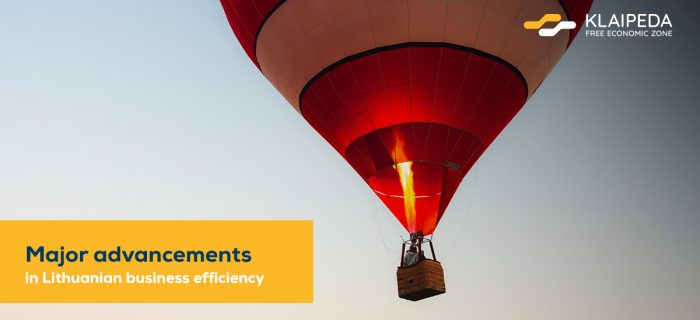News & Events
Watch our activity in one place
Lithuania Rises to 29th Place in World Competitiveness Ranking

Lithuania took the 29th place in the worldwide competitiveness ranking, aggregated by the Swiss IMD World Competitiveness Center. Compared to previous results, Lithuania has risen three places, leaving its neighbors behind as well. Estonia is 35th, down from 31st last year, Latvia, which was 40th last year and stayed in that place, as well as Poland, which is 38th, down from the 34th place.
In the process of constructing the ranking, IMD evaluates how countries utilize their available resources and competencies to increase their well-being. This year, 63 countries made it into the ranking, they were evaluated according to 235 different criteria. Two-thirds of these factors are economic facts and financial, business data figures, while the remaining third was gathered after questioning business leaders. Enterprise Lithuania is an entrepreneurship support non-profit and the Lithuanian partner to IMD. It provided the statistical data analysis and helped to survey Lithuanian business leaders, as needed for the IMD rankings.
The figures that contributed the most to Lithuania’s rise in the IMD rankings were related to business efficiency, where Lithuania climbed to the 23rd place from 30th and the government efficiency numbers, where Lithuania moved up to the 29th place from the 31st. The economic performance numbers dipped a little bit (to 39th from 36th), as well as the infrastructure measuremes, where Lithuania is now 30th, down from the 29th place.
“The strained situation in the employment market forced Lithuanian companies to look for new ways to remain competitive. Utilizing European Union investment tools and their own resources, an increasing number of companies invest in raising productivity,” says Virginijus Sinkevicius, the Lithuanian Minister of the Economy and Innovation. “New mechanical tools, new IT systems, and employee education allow wages to rise. It is especially important that this trend did not only remain in the big cities exclusively but was also successfully transported to the less developed regions as well. This success was noticed and suitably influenced the Lithuanian results in the competitiveness rating.
Daina Kleponė, the Managing Director of Enterprise Lithuania, says that the improving image the public sector has in the eyes of the Lithuanian business, shows that Lithuanian public institutions are increasingly responding well to the needs of Lithuanian business, taking initiative to improve the business environment, the relationship between business and the government is becoming a fruitful partnership.
The evaluation of the government institutions is becoming better, which is extremely important when your goal is to improve the business environment and to start changes, which would create added value for the country’s business and the economy overall. According to the leaders of various companies, the public sector improved its ability to adapt to changes in the environment, the level of bureaucracy has been decreased, while also improving transparency, improving the public sales processes and rising in some other factors as well. Another factor that contributed to the higher evaluation of the public sector effectiveness was also the better evaluation of work environment regulation, which changed due to the new Labor Code, which has come into force in 2017,” D. Kleponė says when commenting on the results of the Enterprise Lithuania research.
According to the analysis by Enterprise Lithuania, the country’s economic performance ranking dropped to the 39th place because of the size of the Lithuanian economy and its slightly slowed growth in 2017. High economic measures from 2017 created a strong base for comparison, so less impressive results from 2018, as well as slightly more conservative growth prognosis for 2019 determined the drop in this part of the rating.
The group of infrastructure criteria envelops factors like basic infrastructure (territories, roads, railroads, population, resources, energy sector), technological infrastructure, as well as health and education infrastructures. All the infrastructure groups mentioned above rose in ranks in 2019, except for the scientific infrastructure, which determined a small drop in the rankings for this criterion.
Enterprise Lithuania presents five economic competitiveness challenges, which will determine the future growth potential of Lithuanian economic competitiveness worldwide. They are the enhancement of economic productivity and investment; the encouragement of research and development and its utilization in practice; attracting direct investment into growing medium-high and high technologies; keeping the export and business competitiveness growth consistent, especially for small and medium-sized companies; and reaching social agreement on the appropriate size of the public sector so that public services are sufficiently financed.
The IMD World Competitiveness Ranking has been first completed in 1989 and has been presented for the 31st time this year. Lithuania has first entered the rankings in 2007. Find more about the IMD World Competitiveness Ranking 2019 here.
